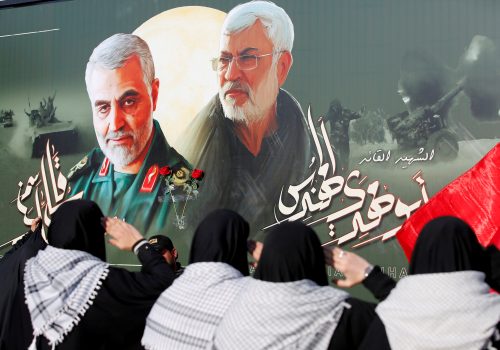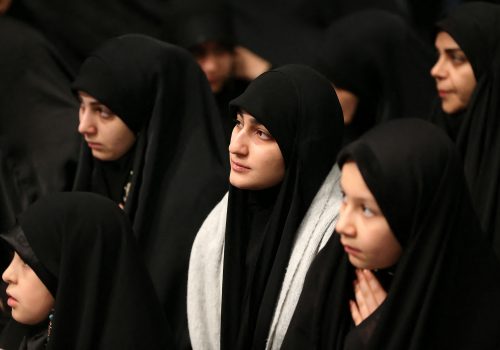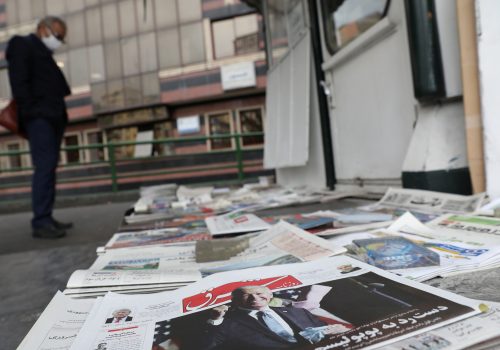The Qasem Soleimani assassination feels like ages ago—but Iran hasn’t forgotten
On a recent episode of the Iranian version of Shark Tank, a cleric pitches his first-person shooter video game series, Operation Destruction. “Why must our children be playing the protagonist of [Qasem] Soleimani’s assassination in video games? Why not build a game that makes us the soldiers of Qasem—isn’t that everyone’s dream?”
Cleric Habib Dastani, a game designer with fifteen years of experience, knows that name-dropping Iran’s slain top general is a good selling point to Iran’s 28 million gamers.
As we near the first anniversary of the January 3 US drone strike on Qasem Solemani, President Donald Trump continues to tout the military action as a signature success of his administration. Though the world has completely changed since that day a year ago—and Soleimani’s death may now be an afterthought for most Americans—the Islamic Republic hasn’t forgotten, even with Trump’s 2020 presidential election defeat.
To many outside Iran, Soleimani was a terrorist that caused death and destruction across the region through the Islamic Revolutionary Guard Corps’ (IRGC) elite foreign arm, the Quds Force. But to many Iranians, he was a national hero who prevented ISIS from seizing Iraq and invading Iran. According to a poll by the Center for International and Security Studies at Maryland, Soleimani’s popularity climbed from 73 percent in 2016 to 82 percent in 2019—making him the post popular figure in Iran.
In life, Soleimani had a cult following with his image displayed ubiquitously. In death, his status has been further elevated to martyr. Shia iconography depict him alongside Imam Hossein, the Shia saint that was martyred at the Battle of Karbala in 680 AD—coincidentally, also in Iraq. He also appears in government propaganda art. Soleimani has been posthumously promoted from major general to lieutenant general—a first in the IRGC. Less than a week after his death, hundreds of streets, squares, buildings, and even border crossings were renamed in his honor—including a street in Lebanon. His childhood home in Kerman province is to be turned into a museum. In July, the Iranian national broadcaster announced that it would be releasing Commander of Peace, a forty-episode docuseries of Soleimani’s role in the conflicts across the region. In August, a permanent museum exhibit dedicated solely to him was inaugurated in Tehran. And in December, a new website with over 9,000 articles and photos was launched in several languages to “spread the public knowledge and awareness” of Soleimani.
Even more interesting are the more than dozen games and informational apps—with photos and a biography of the general, including backgrounds on Soleimani’s roles in the Iran-Iraq War, Syrian Civil War, and the fight against ISIS—some of which were released only post mortem. Another first-person shooter game, Harsh Revenge, includes a trailer with a reenactment of the drone strike and Soleimani’s massive funeral in Tehran.
“Soleimani had been promoted, by himself and the regime, as a supra-political icon—a man of the people, an Iranian patriot—so naturally he had a large following, beyond the base of the diehard regime supporters,” says Arash Azizi, the author of the new book, The Shadow Commander: Soleimani, the US, and Iran’s Global Ambitions. “His assassination, by the direct orders of President Trump, and his repeated boastings about it only added to this sense of Soleimani being an iconic figure.”
In the immediate aftermath of the strike on Soleimani outside Baghdad’s international airport, experts debated the merits of taking out such a high-profile Iranian official. Bob Woodward’s book, Rage, notes that both Senator Lindsey Graham (R-SC) and President Trump’s then acting chief of staff Mick Mulvaney tried to push back on his desire take out Soleimani. In the aftermath, on January 8, 2020, Iran fired ballistic missiles that caused traumatic brain injuries to 100 American troops at Al Asad base outside Baghdad. Iran also accidentally shot down a Ukrainian civilian airliner, killing all 176 people on board—mistaking it for a US attack on Tehran’s main airport. Iran-backed Shia militias have staged additional attacks in Iraq since then, killing two Americans and a British soldier in March and continuing to target the US Embassy in Baghdad and US convoys with rockets. In part, as a result, Trump has consolidated US presence in Iraq and will withdraw 3,000 of the 5,200 US service personnel.
US intelligence has been monitoring other potential targets for Iranian retaliation, while the Department of Homeland Security has anticipated cyberattacks. In September, news broke that Iran is reportedly weighing a plot to assassinate the US ambassador to South Africa, possibly due to her close relationship with Trump. The US military is already anticipating a possible attack on US interests and troops in Iraq on the anniversary, and has deployed two B-52 bombers to the region to deter Iran. A retaliation or series of retaliations of this caliber was anticipated by experts in the months—if not years—to come. Tehran won’t allow such a momentous blow, the killing of a revered top general, to go unanswered. The retaliatory missiles fired at Iraqi bases housing US forces was, in the words of Supreme Leader Ayatollah Ali Khamenei, just a “slap in the face”—a rapid response to alleviate calls for revenge. On December 16, the Supreme Leader’s Twitter account tweeted, “revenge will certainly happen at the right time.”
Azizi notes that though Soleimani has captured the imagination of many Iranians, not all are fans. The latest edition of Defense Readiness, a schoolbook taught to Iranian high schoolers, mentions Soleimani on every few pages with photos or by name. In a video, an unamused student flips the book’s pages expressing her frustration that she has to study the slain commander as part of her curriculum three hours a week and even take tests.
Efforts to enshrine Soleimani’s legacy at home continue while potential retribution remains uncertain. A year after Soleimani’s death, Iranians haven’t forgotten—and the Iranian government will make sure that they don’t.
Holly Dagres is editor of the Atlantic Council’s IranSource blog, and a nonresident fellow with the Middle East Programs. She also curates The Iranist newsletter. Follow her on Twitter: @hdagres.
Image: An Iranian woman holds a picture of Qassem Soleimani, during a ceremony to mark the one year anniversary of the killing of senior Iranian military commander General Qassem Soleimani in a U.S. attack, in Tehran, Iran January 1, 2021. Majid Asgaripour/WANA (West Asia News Agency) via REUTERS


